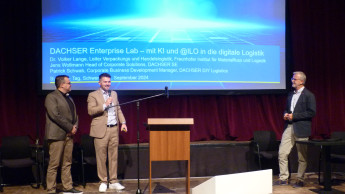In order to get better prices for sea freight, the company X Staff (pronounced “Cross Staff”) bundles demand. This allows larger quantities to be negotiated with the shipping companies. This model is open to dealers and manufacturers alike. (See the report in this issue.) Markus Schering, managing director of the industry logistics association Synlog, explains how industry can use it.
How is the market for ocean freight looking at the moment?
Markus Schering: If we look at the shipping companies, the market is characterized by the fact that there are ever stronger oligopolistic tendencies. Individual shipping companies are buying up other shipping companies, merging or forming alliances. This is no longer a competitive situation and makes the supplier side manageable. For DIY store suppliers who procure goods in this way, it makes things more difficult. Even if the individual supplier had a four-digit TEU (twenty-foot equivalent unit, 20-foot container) to award, they would have a very weak market position.
So even retailers who import themselves are in the same weak position here, aren't they?
Yes, although a trading company may have a slightly higher purchasing volume and is therefore more relevant than an individual manufacturer. It is particularly difficult for the latter, especially since they pick up their goods not only from one port or even one country. Meanwhile, countries such as Vietnam, Taiwan and India are becoming increasingly important as sourcing markets. Then you have to deal with other shipping companies and also split the volume.
So what are the benefits for a manufacturer of working with a company like X Staff?
First and foremost, you want reliability. As a client, I want to be sure that the conditions I have negotiated and been promised will ultimately be effective – that means that my business remains stable and that the containers I bring to the port are actually loaded onto the ship. Nothing is worse than when the supply chain cannot be planned, you run into out-of-stock situations, retailers may make demands and business volume may even be lost. So: the top priority is reliability. And it is more difficult for an individual company to demand this than it is when large quantities are bundled. Alternatively, you can go through a freight forwarder, but in many cases, the shipping company is also only a small partner for the freight forwarder.
But surely price is also an important advantage, isn't it?
Prices are certainly the measure of all…

 Menü
Menü












 Newsletter
Newsletter